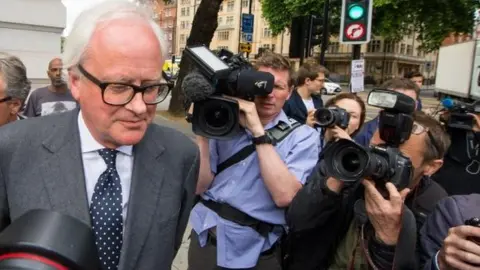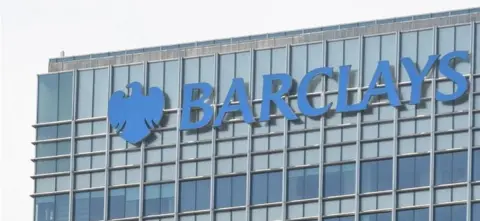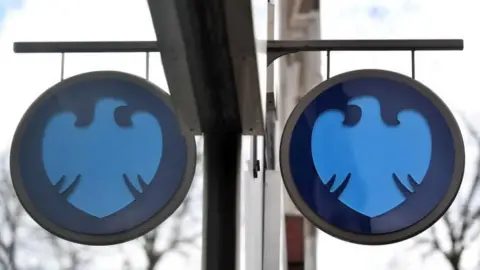Prepare yourself for a high-stakes Barclays battle
 PA
PAThe four defendants made their way through a thick press pack to take their seats - in the dock - at Westminster Magistrates court yesterday. It was a sight many thought they would never see. Senior bank executives inside a criminal court to face charges for their conduct during the great financial crisis.
Former chief executive John Varley and bankers Roger Jenkins, Tom Kalaris and Richard Boath sat, stony-faced, next to each other behind the glass panel as they gave their names, date of birth and addresses and listened as the charges against them were read by the clerk of the court.
In 2008, at the height of the financial crisis - rather than taking a government bailout (and the strings attached to it) - Barclays managed to raise a total of £12bn from Middle East investors.
This case centres around agreements struck to secure around half of that from Qatar state-owned entities.
There are two offences alleged - the first is that Barclays failed to disclose £322m in fees that it paid to its new investors - all four are facing this charge of conspiracy to defraud by misrepresentation. The second is that Barclays lent the Qataris £2bn which helped to fund the £5.3bn investment in Barclays shares. John Varley, Roger Jenkins and Barclays PLC are facing this additional charge of unlawful financial assistance. All four men are expected to contest the charges. Barclays PLC has not indicated how it will plead.
The possibility that the company may enter a different plea is important and ratchets up the stakes in this high profile case - and not just for the defendants.
The four men could face jail terms of up to 10 years if found guilty.
Barclays PLC, the holding company that owns Barclays Bank, could face hundreds of millions in fines for criminal behaviour and open itself to hundreds of millions more in civil suits.
But for the Serious Fraud Office (SFO) this case coincides with a moment of existential anxiety. The Conservative manifesto contained plans to fold the SFO into the National Crime Agency and no-one in government seems clear whether the policy's omission from the Queen's Speech means it has had a reprieve or not. What is clear is that at the time he was deciding to bring these charges, the head of the SFO, David Green, would have assumed the government planned to call time on its 30-year existence. This could be the last hurrah of an organisation with a chequered history.
If it is its goodbye, the SFO has picked a hell of swansong. It's the first time that any senior banking executives have faced criminal charges for their conduct in the great financial crisis nearly a decade ago. Some will say a case like this is scandalously overdue, but legal experts tell me that it also shows you just how difficult it is to bring a case like this and therefore just how high the risks are to the credibility of the SFO if it's unsuccessful.
 AFP
AFPThe biggest complication comes from charging the company - in this case Barclays PLC.
Criminal proceedings against companies are rare. Not only because you have to prove that the knowledge of the offence went right to the very top - to the "controlling minds" of the company - but also, officials are reluctant to punish a company when doing so might result in damaging its prospects, the livelihoods of innocent workers and in the case of big companies, the economy itself.
Public interest considerations like these are the reason the SFO dropped its long-running investigation into BAE Systems infamous Al-Yamamah contract to supply fighter jets to Saudi Arabia. Tens of thousands of UK jobs were at risk for two reasons. One, the investigation risked putting one of BAE's biggest customer's nose out of joint and second, criminal convictions for a company can debar it from bidding for lucrative contracts at home and abroad.
This problem was one of the main reasons behind the adoption of a new mechanism called a Deferred Prosecution Agreement (DPA). Under a DPA, the company admits wrongdoing, gets a whopping fine but is not criminally convicted - and so its business, the livelihoods of its workers and the wider economy are not damaged. Everyone is also spared a lengthy and costly trial that might end up without the SFO securing a conviction.
The SFO has used DPAs to great effect with Rolls Royce (£671m fine) and Tesco (£129m). In fact, these successes led to many thinking the SFO had finally got its mojo back. Holding big companies to account without holding the economy to ransom. The SFO also reserves the right to feel the collars of the individuals involved at a later date.
So why wasn't this lower risk approach used by the SFO in this case?
Mr Green made it clear that DPAs are only for companies who fully co-operate with investigators. Barclays withheld tens of thousands of documents citing legal privilege - behaviour Mr Green described as leading the SFO "a merry dance". Barclays points out that it's unreasonable to punish the bank for exerting legal rights. Nevertheless, a DPA was never put on the table. The SFO has made a concession to the economic importance of Barclays to the UK. It has charged the holding company (Barclays PLC) rather than the operating company, Barclays Bank. This means the ability of this important transatlantic bank to operate in its key markets should not be affected - whatever the outcome.
Many feel that the SFO, after years of mixed results, was just getting into its stride when plans for its demise were hatched and published in the Tory manifesto. Perhaps that contributed to the SFO's decision to go out in a blaze of glory of pressing for criminal convictions of both a bank and its senior management.
 AFP
AFPNearly a decade on from a financial crisis and this is the first time any former bank chief executive anywhere in the world has faced criminal charges for alleged conduct during the greatest financial crisis since the 1930s. A society that paid the price of a long recession which scars the economy to this day feels short-changed by that and one insider close to the investigation described SFO chief Mr Green as being on "a crusade" to acknowledge that frustration.
Whether there is any truth in that or not, one thing seems clear. Taking this route is a lot riskier for the SFO than offering a DPA.
Philip Marshall QC told the BBC that it is very difficult to prove that executive actions were dishonest rather than mistaken and other legal sources have told me that this case could last two years or more.
Also, what happens if the company pleads guilty while the human defendants plead not guilty? What kind of reporting restrictions might be necessary given a public company's duty to inform its shareholders of information that could materially affect the value of the company. This is complicated territory.
Let's not forget one more thing. A LOT of bad stuff happened before, during and after the crisis. Reckless lending, irresponsible borrowing, lax regulation, market rigging, financially abusing customers - you can add your own items to this list.
Former City Minister Lord (Paul) Myners has said that the Barclays top brass wanted nothing to do with government money - not least because of the intrusion that would mean into matters like pay (just ask bankers at RBS and Lloyds). Also markets lose their integrity and participants all lose if some break the law - as is alleged here.
But how many people, I wonder, would put a bank - trying to raise money to prevent a taxpayer funded bailout - in the ninth circle of Hades.
The SFO is taking a big risk it could have avoided by exacting a whopping fine through a DPA. The appearance of these executives inside a criminal court may slake the public's thirst for overdue personal accountability. So far, they have only spent an hour in court.
The weeks, months and possibly years to come will determine if the SFO picked the right battle here.
